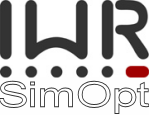|
Software practicals
The Simulation and Optimization group offers software practicals for
bachelor and master students (or equivalent, e.g., Diplom) who aim for
a degree in mathematics, physics, or computer science.
Software practicals are not seminars, but are project oriented.
Students work alone or in
small groups on a well-defined project under the supervision of one or
two members of the group (PhDs, PostDocs, advanced MSc/Diplom students).
The number of students allowed per practical depends on the project.
Meetings with the supervisors are scheduled personally and on demand.
The practicals are divided into beginners'
and advanced practicals. The workload of a beginners' practical is 40
hours per person. The workload of an advanced practical is 80 hours
per person. Beginners' practicals also have lower requirements on the
students' skills.
Students enrolled at the University of Heidelberg can
earn certificates (Schein für Anfängerpraktikum oder
Fortgeschrittenenpraktikum). For students of other universities who currently
stay in Heidelberg,
including students of other countries, it is possible to issue special
certificates.
Open Software Practicals
Students or groups of students must apply separately for each software practical.
The application should be sent by e-mail to the respective
practical supervisor. The application should comprise in tabular form:
- the names of the students in the group,
- their respective aspired degree (e.g., MSc in mathematics with minor computer science),
- relevant courses taken (e.g., Informatik I, Numerik 0-2, etc. or similar for non-Heidelberg students),
- a concise comment on the personal motivation for undertaking the selected
practical and on prospects for continuing with a Diplom, MSc, BSc, or even a PhD degree in the Simulation and Optimization group.
A prospective MSc or Diplom student can benefit
significantly from an advanced software practical by becoming familiar with the group's
methods and software packages.
Advanced
Beginners
Implementing a smartphone-based Math-Rally in Heidelberg.
Eigenvalue based solving of trust region problems.
Testing, Extending and Documenting Python Interface to Integrator SolvIND.
Interfacing Integrator SolvIND with Automatic Differentiation Packages CasADi, CppAd and Adept.
Running software practicals
Examples of completed software practicals
Contact
For general questions please contact
Felix Lenders
IWR, Universität Heidelberg
Im Neuenheimer Feld 205, 2/407
felix.lenders@iwr.uni-heidelberg.de
back
|

